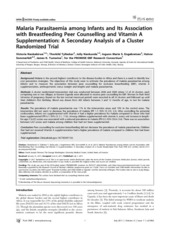| dc.contributor.author | Nankabirwa, Victoria | en_US |
| dc.contributor.author | Tylleskär, Thorkild | en_US |
| dc.contributor.author | Nankunda, Jolly | en_US |
| dc.contributor.author | Engebretsen, Ingunn Marie S. | en_US |
| dc.contributor.author | Sommerfelt, Halvor | en_US |
| dc.contributor.author | Tumwine, James K. | en_US |
| dc.date.accessioned | 2011-11-07T14:08:49Z | |
| dc.date.available | 2011-11-07T14:08:49Z | |
| dc.date.issued | 2011-07-07 | eng |
| dc.Published | PLoS ONE 6(7): e21862 | en |
| dc.identifier.issn | 1932-6203 | |
| dc.identifier.uri | https://hdl.handle.net/1956/5156 | |
| dc.description.abstract | Background: Malaria is the second highest contributor to the disease burden in Africa and there is a need to identify low cost prevention strategies. The objectives of this study were to estimate the prevalence of malaria parasitaemia among infants and to measure the association between peer counselling for exclusive breastfeeding (EBF), vitamin A supplementation, anthropometric status (weight and length) and malaria parasitaemia. Methods: A cluster randomized intervention trial was conducted between 2006 and 2008 where 12 of 24 clusters, each comprising one or two villages, in Eastern Uganda were allocated to receive peer counselling for EBF. Women in their third trimester of pregnancy (based on the last normal menstrual period) were recruited in all 24 clusters and followed up until their children’s first birthday. Blood was drawn from 483 infants between 3 and 12 months of age, to test for malaria parasitaemia. Results: The prevalence of malaria parasitaemia was 11% in the intervention areas and 10% in the control areas. The intervention did not seem to decrease the prevalence of malaria (PR 1.7; 95% CI: 0.9, 3.3). After controlling for potential confounders, infants not supplemented with Vitamin A had a higher prevalence for malaria compared to those who had been supplemented (PR 6.1; 95% CI: 2.1, 17.6). Among children supplemented with vitamin A, every unit increase in lengthfor- age Z (LAZ) scores was associated with a reduced prevalence in malaria (PR 0.5; 95% CI:0.4, 0.6). There was no association between LAZ scores and malaria among children that had not been supplemented. Conclusion: Peer counselling for exclusive breastfeeding did not decrease the prevalence of malaria parasitaemia. Children that had not received Vitamin A supplementation had a higher prevalence of malaria compared to children that had been supplemented. | en_US |
| dc.language.iso | eng | eng |
| dc.publisher | Public Library of Science | eng |
| dc.relation.ispartof | <a href="http://hdl.handle.net/1956/5157" target="blank">Child health in a Ugandan cohort: Studies on survival, vaccination and malaria</a> | eng |
| dc.rights | Attribution CC BY | eng |
| dc.rights.uri | http://creativecommons.org/licenses/by/2.5/ | eng |
| dc.title | Malaria Parasitaemia among Infants and Its Association with Breastfeeding Peer Counselling and Vitamin A Supplementation: A Secondary Analysis of a Cluster Randomized Trial | en_US |
| dc.type | Peer reviewed | |
| dc.type | Journal article | |
| dc.description.version | publishedVersion | en_US |
| dc.rights.holder | Copyright the author. All rights reserved | |
| dc.identifier.doi | https://doi.org/10.1371/journal.pone.0021862 | |
| dc.subject.nsi | VDP::Medical disciplines: 700::Clinical medical disciplines: 750::Pediatrics: 760 | eng |

